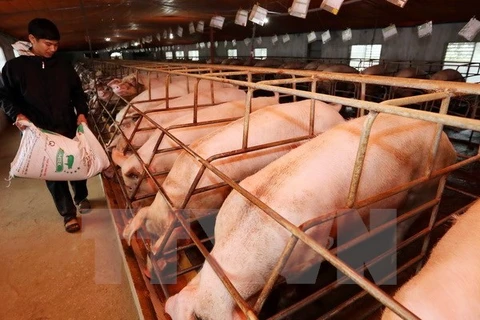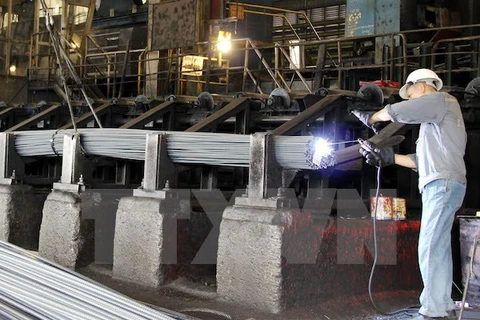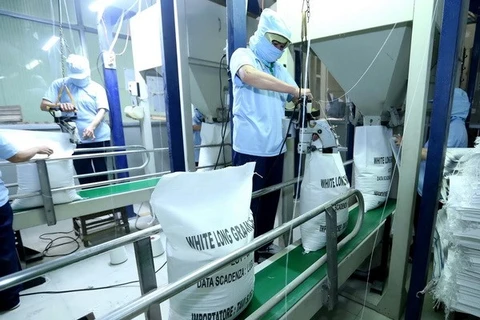HCM City (VNS/VNA) - The Government should reconsider its ban on the import of wheat infected with cirsium arvense, a kind of weed, participants told a seminar in Ho Chi Minh City on October 8, warning it would have an adverse impact on businesses.
Ly Kim Chi, Chairwoman of the HCM City Food and Foodstuff Association, said the association received complaints from many businesses about difficulties they would face because the Plant Protection Department recently issued an official dispatch saying wheat imported from Russia, the US, Canada, and Australia that contain cirsium arvense will have to be re-exported or be banned starting on November 1.
According to the department, the weed seed would harm the Vietnam environment and agriculture.
But Vietnam has imported wheat for many decades from these countries and there has not been an adverse impact on the environment, and other countries such as Thailand and Malaysia, big importers of US wheat, have not banned it either, Chi said.
There has been no research on the impacts of the weed on humans and the environment in Vietnam, she said.
The period between issuing the regulation and the date it takes effect is too short for businesses to find alternative sources, and since many have already signed contracts, their consignments may be on the way, she said.
Dr Tran Duy Khanh said the kind of weed seed only competes for nutrition with other crops, mainly wheat.
So if enterprises import wheat to grow seedlings, the import should be banned, but they import for processing flour or making animal feed, and so the Government should not ban it, he said.
Phan Thanh Hieu, Deputy General Director of the Binh An Flour JS Company, asked: “how can we find alternative import sources in such a short time?"
“If we have not figured out the harm caused by the weed seed, the Government should delay the implementation of this regulation and wait for research into it.”
Le Van Vu, Deputy General Director of the Binh Dong Flour Company, said: “We are very worried about the ban on the import of wheat containing the weed.”
Businesses would not be able to find alternative sources, and since flour demand is very high, the implementation of the ban would inevitably lead to shortages of raw materials in many other sectors, he said.
Phan Thong Cuong of the Vikibomi Corp said in Vietnam enterprises separate cirsium arvense from wheat before making flour, and the former is burnt at high temperatures.
“Faced with this ban, we asked our customers in the US and Russia to separate cirsium arvense from wheat before exporting to Vietnam, but they did not agree.”
Wheat is harvested by machine and so also contains cirsium arvense, and if they have to separate the weed from the wheat they have to invest in another machine, he explained.
Only Vietnamese firms ask them to do it while other customers do not, he said.
Participants at the seminar said the Government should delay the ban so that businesses have time to adjust.
Besides, it should conduct thorough research into the impact of this weed before banning the import, they said.
The association plans to gather the opinions of businesses and experts about the regulation and submit to the Government for consideration.
According to the customs department, Vietnamese businesses imported 3.13 million tonnes of wheat worth 743 million USD in the first seven months of this year, up 2.2 percent in volume and 16.6 percent in value compared to the same period last year.-VNS/VNA
Ly Kim Chi, Chairwoman of the HCM City Food and Foodstuff Association, said the association received complaints from many businesses about difficulties they would face because the Plant Protection Department recently issued an official dispatch saying wheat imported from Russia, the US, Canada, and Australia that contain cirsium arvense will have to be re-exported or be banned starting on November 1.
According to the department, the weed seed would harm the Vietnam environment and agriculture.
But Vietnam has imported wheat for many decades from these countries and there has not been an adverse impact on the environment, and other countries such as Thailand and Malaysia, big importers of US wheat, have not banned it either, Chi said.
There has been no research on the impacts of the weed on humans and the environment in Vietnam, she said.
The period between issuing the regulation and the date it takes effect is too short for businesses to find alternative sources, and since many have already signed contracts, their consignments may be on the way, she said.
Dr Tran Duy Khanh said the kind of weed seed only competes for nutrition with other crops, mainly wheat.
So if enterprises import wheat to grow seedlings, the import should be banned, but they import for processing flour or making animal feed, and so the Government should not ban it, he said.
Phan Thanh Hieu, Deputy General Director of the Binh An Flour JS Company, asked: “how can we find alternative import sources in such a short time?"
“If we have not figured out the harm caused by the weed seed, the Government should delay the implementation of this regulation and wait for research into it.”
Le Van Vu, Deputy General Director of the Binh Dong Flour Company, said: “We are very worried about the ban on the import of wheat containing the weed.”
Businesses would not be able to find alternative sources, and since flour demand is very high, the implementation of the ban would inevitably lead to shortages of raw materials in many other sectors, he said.
Phan Thong Cuong of the Vikibomi Corp said in Vietnam enterprises separate cirsium arvense from wheat before making flour, and the former is burnt at high temperatures.
“Faced with this ban, we asked our customers in the US and Russia to separate cirsium arvense from wheat before exporting to Vietnam, but they did not agree.”
Wheat is harvested by machine and so also contains cirsium arvense, and if they have to separate the weed from the wheat they have to invest in another machine, he explained.
Only Vietnamese firms ask them to do it while other customers do not, he said.
Participants at the seminar said the Government should delay the ban so that businesses have time to adjust.
Besides, it should conduct thorough research into the impact of this weed before banning the import, they said.
The association plans to gather the opinions of businesses and experts about the regulation and submit to the Government for consideration.
According to the customs department, Vietnamese businesses imported 3.13 million tonnes of wheat worth 743 million USD in the first seven months of this year, up 2.2 percent in volume and 16.6 percent in value compared to the same period last year.-VNS/VNA
VNA
























